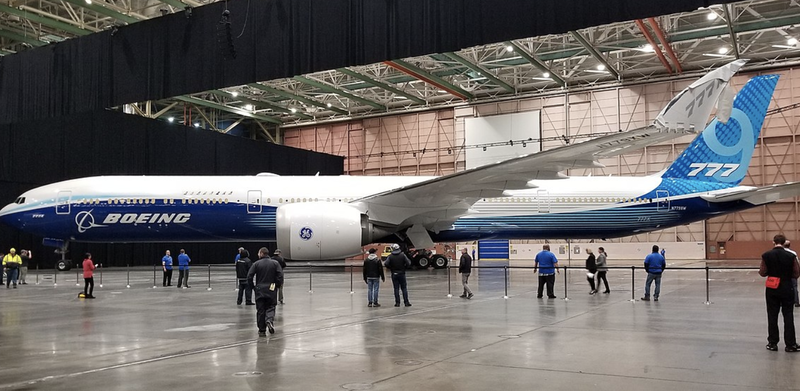From The Seattle Times

By Dominic Gates
A Boeing engineer who last year lodged an internal ethics complaint alleging serious shortcomings in development of the 737 MAX has written to a U.S. Senate committee asserting that systemic problems with the jet’s design “must be fixed before the 737 MAX is allowed to return to service.”
The letter to the Senate, a copy of which was obtained by The Seattle Times, was written by engineer Curtis Ewbank, a 34-year-old specialist in flight-deck systems whose job when the MAX was in early stages of development involved studying past crashes and using that information to make new planes safer.
His letter, sent earlier this month, argues that it’s not enough for Boeing to fix the flawed Maneuvering Characteristics Augmentation System (MCAS) that’s known to have brought down the aircraft in two crashes in Indonesia and Ethiopia.
“I have no doubt the FAA and lawmakers are under considerable pressure to allow the 737 MAX to return to service as quickly as possible and as soon as the public MCAS flaw is fixed,” Ewbank told the Senate. “However, given the numerous other known flaws in the airframe, it will be just a matter of time before another flight crew is overwhelmed by a design flaw known to Boeing and further lives are senselessly lost.”
He goes on to suggest similar shortcomings in the flight-control systems may affect the safety of Boeing’s forthcoming 777X widebody jet.
Ewbank’s letter also reveals that he has been interviewed about his concerns by the FBI, which suggests his allegations have at least been considered as part of the Justice Department’s probe into what went wrong on the 737 MAX and whether the actions of anyone at Boeing were criminal.
He mentions he has also delivered details of his allegations to the lead investigator on the U.S. House Committee on Transportation, chaired by Rep. Peter DeFazio, D-Ore.
In 2014, during early work on the MAX’s development, Ewbank worked unsuccessfully to have Boeing upgrade the MAX’s flight-control systems by adding a new data measurement system called Synthetic Airspeed that would have served as a check on multiple sensors. If it had been implemented, he believes it might have prevented the fatal crashes.
Ewbank’s original internal ethics complaint, first reported last October by The Seattle Times, alleged that Boeing rejected his safety upgrades because of management’s focus on schedule and cost considerations and the insistence that anything that might require more pilot training would not be considered.
He also alleged that Boeing pushed regulators at the Federal Aviation Administration (FAA) to relax certification requirements for the airplane, particularly in regard to the cockpit systems for alerting pilots that something is wrong inflight.
Those systems on the MAX have been under scrutiny because during the two fatal MAX crashes that killed 346 people, pilots struggled to understand the cascade of warnings in their cockpits.
‘Hand-waving and deception’
Ewbank’s letter to the Senate Committee on Commerce, Science, and Transportation was sent June 5, ahead of a public hearing Wednesday that featured scathing criticism of FAA Administrator Stephen Dickson for his agency’s lack of progress in addressing the lapses of oversight in certifying the MAX.
Ewbank criticizes not only Boeing for its design of the MAX but also the FAA for approving the design without proper oversight.
“The 737 MAX’s original certification was accomplished with hand-waving and deception to hide the numerous ways the 1960s-era design of the 737 does not meet current regulatory standards,” he wrote.
And he hit out at a recent Department of Transportation (DOT) advisory panel report on the MAX crashes that recommended only minor changes to the way airplanes are certified, preserving Boeing’s central role in that process. Ewbank called the report “a serious threat to aviation safety and the flying public.”
“If the FAA was truly regulating in the public interest, it would take action against Boeing for its continued deception and gross errors in the design and production of the 737 MAX by withdrawing Boeing’s production certificate,” he concluded.
Ansley Lacitis, deputy chief of staff for Democratic Sen. Maria Cantwell of Washington, said her office “was made aware of the letter right before the hearing” on Wednesday.
“The first step of a whistleblower investigation is to make contact with the whistleblower and we have done that,” Lacitis said. “We take these and other allegations seriously and continue to investigate them.”
In a statement, Boeing said company officials have not seen the letter.
“Boeing offers its employees a number of channels for raising concerns and complaints and has rigorous processes in place that ensure complaints receive thorough consideration and protect employee confidentiality,” the statement said. “Boeing does not comment on the substance or existence of such internal complaints.”
Boeing’s statement adds that “when the MAX returns to service, it will be one of the most thoroughly scrutinized aircraft in history, and we have full confidence in its safety.”